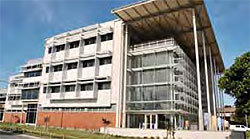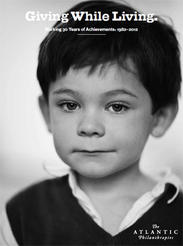Providing for the University of the Western Cape to Reach New Levels of Excellence
Resource type: Grantee Story

School of Public Health. Photo: UWC
In 2005, Founding Chairman Chuck Feeney decided that Atlantic would invest in a state-of-the-art Life Sciences building for the University of the Western Cape (UWC) after learning that researchers at this historically disadvantaged school were producing internationally recognised work despite outdated facilities and technology.
At the time, UWC researchers were conducting Africa’s leading groundwater data collection and analysis and developing the first side-effects free male contraceptive pill. Furthermore, the United Nations selected UWC’s South African Herbal Sciences and Medicines Institute (SAHSMI) to establish a global centre for the study of traditional medicines.
By 2010, the new building became the home of SAHSMI and the National Bioinformatics Institute, the Water Research Programme, Groundwater Centre, Male Fertility Research unit and six academic departments.
‘In these labs, our scholars will engage in finding ways to create a better life for our beautiful country, our continent and the wider world.’ – Desmond Tutu at the Life Sciences building dedication
“The Atlantic Philanthropies’ support for life sciences came at a critical stage of UWC’s history,” explained UWC Rector Brian O’Connell. “We were on the cusp of being recognised as a serious research university, when Atlantic gave us its confident support and undoubtedly the most advanced science building on the continent.”
To further bolster UWC, Atlantic funded a state-of-the-art building for the School of Public Health (SOPH), which opened in 2009. SOPH is increasingly seen as a centre of excellence by the international public health community, and the World Health Organization designated it a “Collaborating Centre for Research and Training in Human Resources for Health.” SOPH houses the new Centre for Research in HIV and AIDS, which is strengthening collaboration among UWC and other African institutions.
Today, the South African National Research Foundation (NRF) ranks UWC first in research impact in biology and biochemistry, molecular biology and genetics, and physics. Breaking another barrier, UWC produces the largest number of black and female science graduates, a noteworthy achievement for a school founded as a coloured university during apartheid that continues to educate mostly low-income, black students.
Atlantic provided ZAR190 million ($26 million) for the two buildings, significantly boosting UWC’s growing research reputation. Its NRF-rated researchers have grown from 66 to 90 in three years, and UWC’s number of research chairs ranks it fourth nationally.
In keeping with Atlantic’s hallmark of leveraging government support, its UWC investment was the catalyst for far-reaching benefits at this and other universities. By matching the life sciences grant, the national Department of Education (DOE) ended a 15-year moratorium on spending for higher education infrastructure. Since then, DOE has provided universities ZAR3.1 billion ($396 million) plus allocated ZAR3.8 billion ($485 million) through 2014.
UWC has demonstrated that a historically disadvantaged school can compete with the best, confirming Mr. Feeney’s belief that “good buildings for good minds can make a big difference in the lives of a lot of people.”
Giving While Living: Marking 30 Years of Achievements: 1982–2012
> Read more stories of impact in our 30th anniversary publication
University of the Western Cape School of Public Health is also an Atlantic grantee.
